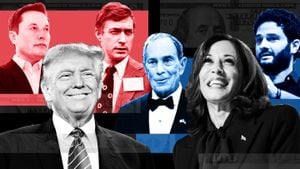With the United States presidential election looming, the political climate is heating up, especially concerning issues of trade and technology. Former President Donald Trump has emerged as one of the main contenders, reigniting debates over tariffs, technology dominance with China, and the impact of U.S. foreign policy on domestic industries.
Just days before Americans head to the polls, Trump made headlines by criticizing Taiwan during his campaign trail. He accused the island country of effectively stealing America’s semiconductor industry, asserting they should 'step up and pay' for the technology advancements they’ve made. This comment has triggered discussions about the future of U.S.-Taiwan relations, especially as Taiwan remains central to global semiconductor production, highlighted by companies like Taiwan Semiconductor Manufacturing Company (TSMC).
At the core of Trump’s economic strategy is his proposal to bolster U.S. tariffs on imports, particularly targeting Chinese and Taiwanese goods. Trump argues this would safeguard American jobs and promote the revival of U.S. manufacturing, echoing policies reminiscent of his administration. During his time as president, he advocated for heavy tariffs on Chinese products, claiming it would protect American companies and workers from unfair competition.
“We cannot afford to let our technology—or our jobs—be sold or stolen,” Trump stated emphatically. Many see this as a continuation of his 'America First' agenda, focusing on enhancing domestic production capabilities and reducing dependence on foreign nations for technological advancements.
The CHIPS Act, which was signed to promote semiconductor manufacturing within the U.S., has also come under scrutiny as Trump pushes for more significant actions. Many believe his criticisms reflect his broader aim to reposition America as the leading semiconductor manufacturer by retraining skilled workers and quickly ramping up production.
Meanwhile, President Biden’s policies are fostering their scrutiny. Critics argue his administration's focus on green initiatives and partnerships with technology firms like Intel may detract from the immediate need for using domestic resources and talent. They claim this has led to delays or complications within manufacturing sectors, particularly as companies grapple with supply chain issues exacerbated during the COVID-19 pandemic. Trump's camp is capitalizing on this narrative, highlighting how his past policies were more favorable for blue-collar workers.
One troubling aspect for both candidates is the rising inflation rate, reported at nearly 8%—a statistic attributed to multiple factors, including rising interest rates imposed by the Federal Reserve and the U.S. federal budget deficit hovering around 6.4% of GDP. Voters will need to weigh their options carefully, especially as they look toward policies they feel will alleviate financial burdens.
According to experts, Trump's economic message resonates with manufacturing states, particularly those heavily reliant on silicon production for technology development. Manufacturing leaders claim there’s great panic within the industry, with many expressing fear over external dependencies, especially amid increasing tensions with China. Reports indicate U.S. industries are advocating for more training programs aimed at developing skilled labor, particularly with trade schools and community colleges stepping up.
On the foreign policy front, Trump’s potential presidency may herald confrontational relationships, especially with China. Recently, top advisers were rumored to have suggested reviving tariffs and re-evaluated trade agreements forged during past administrations, which some argue could plunge global trade relations back to uncertain waters.
Trump has also hinted at renegotiations of the U.S.-Mexico-Canada Agreement (USMCA), seeking to introduce more regulations favoring American workers. His stance seems to reflect voters' growing disillusionment with globalization and the belief it hurts the American economy. This perspective could prove pivotal as the electorate heads to the polls.
Kamala Harris, Biden’s running mate, responded defensively, arguing for continued partnerships with Taiwan, claiming, “We must establish alliances if we want to retain technological superiority.” This statement seeks to reaffirm Biden's intent on bolstering relationships with allies to sustain U.S. prominence on the international stage.
Yet, the emphasis on alliances has not quelled concerns over security and competitiveness. Many manufacturers have amplified calls for reducing dependence on Asian markets for tech imports, stressing the need to reposition manufacturing initiatives back on American soil. There's mounting pressure on Congress to ramp up funding for domestic facilities, especially seen as pivotal for long-term growth.
The semiconductor shortage has become pivotal as the U.S. government contemplates leveraging the CHIPS Act to fund domestic research and support new technology hubs. Some industry leaders assert there needs to be bipartisan support for these initiatives, as they lay foundations for sustainable economic advancements.
Both Trump and Biden face immense pressure to communicate clear strategies to voters on how they plan to navigate this increasingly complex interplay of global competition, inflation, and economic stability. The results of the election could significantly alter the future paths for trade agreements and domestic policies around technology.
For voters, it boils down to finding leaders they believe will prioritize American interests. While Trump presents his abrasive approach as necessary for reclaiming jobs, Biden's advocacy for collaboration promises continued globalization—an agenda voters appear divided on.
So, as citizens prepare to cast their ballots, American industries and technological innovations hang precariously, awaiting the outcome of this defining election. It’s evident; how the candidates tackle themes of trade, tariffs, and technology will likely set the course for the nation's economic future.



